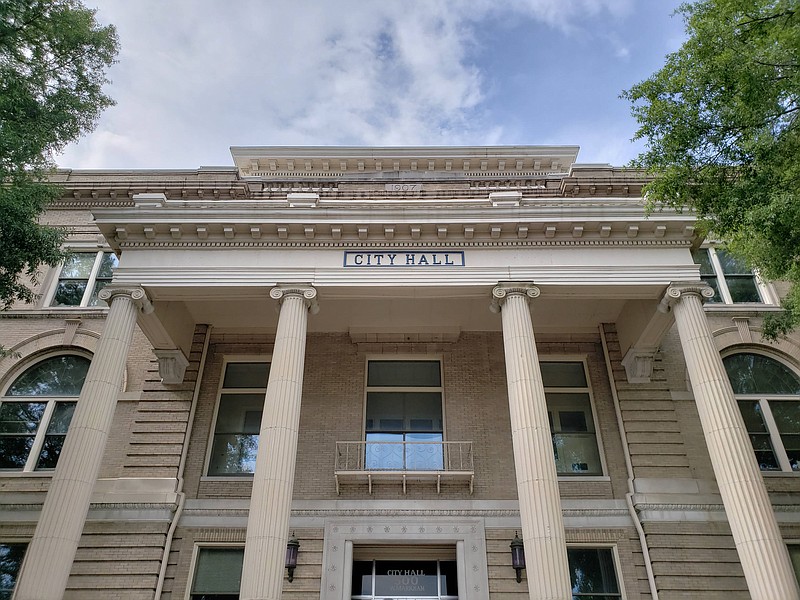The Little Rock Board of Directors at a meeting today is scheduled to decide whether to put Mayor Frank Scott Jr.'s "Rebuild the Rock" sales-tax increase on the ballot during a Sept. 14 special election.
The board vote is happening roughly one month earlier than anticipated.
Board members, led by Ward 3 City Director Kathy Webb, voted 8-2 in May to table the sales-tax package until July 13. But Webb reversed course last week when she asked the mayor to bring the sales-tax proposal back for consideration at today's meeting.
In an interview with the Arkansas Democrat-Gazette on Friday, she said she will vote in favor of the package to send the tax to a citywide referendum.
"Is it perfect? No," Webb said. "Do I know what the people will decide? No. Is the timing right? I don't know. But I will vote to send it out and then ... the people will tell us what they want to do."
Board members will meet in a new location, the auditorium of Little Rock Southwest High School, leaving behind the Robinson Center, which served as their pandemic-era meeting space.
Scott has asked board members to send the 1 percentage-point sales-tax increase to voters in order to get their approval to use $530 million in estimated new tax revenue over the next 10 years to fund parks, public safety, the Little Rock Zoo, infrastructure and early-childhood education.
When meeting materials were released Friday, the new version of the measure to call the special election contained a significant change: a 10-year sunset date for the tax. If approved, it will expire Dec. 31, 2031.
When he unveiled the tax proposal earlier this year, Scott had asked officials to authorize a permanent increase.
Additionally, the latest version of the resolution stating planned spending categories now contains specific projects or initiatives under departmental categories such as parks and recreation, golf and fitness; early-childhood education; infrastructure; and public safety.
An earlier version of the resolution contained percentages showing each category's share of the overall 10-year spending but did not mention specific projects.
Voter approval later this year would result in a net increase of five-eighths percent (0.625%) to the local sales-tax rate because of an existing sales tax of three-eighths percent (0.375%) for capital improvements that is due to expire at the end of the year.
The overall rate in Little Rock would increase to 9.625%.
City Attorney Tom Carpenter did not immediately respond Monday when asked via email if the three sales-tax items -- two ordinances and one resolution -- on the agenda will need to go through the city's first, second and third reading process again in light of recent revisions to the package.
A local group, the Coalition of Little Rock Neighborhoods, has continued to raise questions about elements of the mayor's proposal.
In a letter to the mayor and board members Saturday addressing the changes to the package, the coalition's president, Kathy Wells, said the spending categories mentioned in the resolution remain non-binding, and suggested the planned spending be incorporated into ballot language.
In the letter, she also suggested the package include specific allocations under the category of affordable housing and homelessness, and referred to the coalition's interest in revitalizing vacant lots and houses.
"We need better information about total needs in these housing categories, to determine how closely the proposal would attain the goal of meeting needs we know today," Wells wrote.
She also requested more information about a "proposed indoor sports complex, which will require an annual budget support," adding, "Where is this complex to be built?"
The estimated capital cost to build the new complex is $37 million over the next decade, according to the latest version of the spending resolution.
In a phone interview Monday, Wells said the neighborhood group has not taken a position with regard to whether board members ought to vote down or table the tax package at this week's meeting.
"We never got to that particular decision in the discussion with our coalition members, so I really have no comment about that," Wells said.
Nevertheless, she said, "I can tell you that although people tend to feel this is a fixed date and a fixed process, our observation is that it is not fixed, and could continue in discussion for some time further on."
It would not be a challenge for the state's Department of Finance and Administration to handle the change in the event of a shorter time frame between a successful referendum to authorize the tax and the tax's start date, she suggested.
"The sky does not fall if they, in fact, delay ... they might choose a different allocation," she said.
